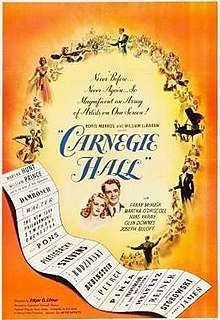Carnegie Hall (film)
Carnegie Hall is a 1947 film directed by Edgar G. Ulmer. It stars Marsha Hunt and William Prince.[1]
| Carnegie Hall | |
|---|---|
 Theatrical release poster | |
| Directed by | Edgar G. Ulmer |
| Produced by | William LeBaron Boris Morros Samuel Rheiner (supervising producer) |
| Screenplay by | Karl Kamb |
| Story by | Seena Owen |
| Starring | Marsha Hunt William Prince |
| Cinematography | William Miller |
| Edited by | Fred R. Feitshans Jr. |
Production company | Federal Films |
| Distributed by | United Artists |
Release date | February 28, 1947 |
Running time | 144 minutes |
| Country | United States |
| Language | English |
Ulmer made Carnegie Hall with the help of conductor Fritz Reiner, godfather of the Ulmers' daughter, Arianné.[2] The New York City concert venue Carnegie Hall serves as the film's setting for the plot and performances presented. A tribute to classical music and Carnegie Hall, the film features appearances by some of the prominent music figures of 20th century performing within the legendary concert hall. Based on a story by silent movie actress Seena Owen, Carnegie Hall follows the life of Irish immigrant Nora Ryan who arrives in America just as the grand concert hall is christened in 1891, and whose life is intertwined with the performers, conductors, aspiring artists and humble employees who call it home. The plot serves as a thread to connect the music performances.
Plot
A mother (Marsha Hunt) wants her son (William Prince) to grow up to be a pianist good enough to play at Carnegie Hall. The son would prefer to play jazz with Vaughn Monroe's orchestra. But Mama's wishes prevail and the son appears at Carnegie Hall as the composer-conductor-pianist of a modern trumpet concerto, with Harry James as the soloist.
Cast
- Marsha Hunt as Nora Ryan
- William Prince as Tony Salerno Jr.
- Frank McHugh as John Donovan
- Martha O'Driscoll as Ruth Hainess
- Hans Jaray as Tony Salerno Sr.
- Alfonso D'Artega as Tchaikovsky
- Cloris Leachman as Dancing Nightclub Patron – Vaughn Monroe sequence (uncredited)
- Barbara Woodell as Nellie – Irish Charwoman (uncredited)
Music guests
- Walter Damrosch (conductor)
- Olin Downes (music critic)
- Jascha Heifetz (violinist)
- Harry James (trumpeter)
- Vaughn Monroe (band leader)
- Jan Peerce (vocalist)
- Gregor Piatigorsky (cellist)
- Ezio Pinza (vocalist)
- Lily Pons (vocalist)
- Fritz Reiner (conductor)
- Artur Rodziński (conductor)
- Arthur Rubinstein (pianist)
- Risë Stevens (vocalist)
- Leopold Stokowski (conductor)
- Bruno Walter (conductor)
- New York Philharmonic Quintet (John Corigliano Sr., William Lincer, Nadia Reisenberg, Leonard Rose, Michael Rosenker)
Music
- Richard Wagner – Prelude from Die Meistersinger von Nürnberg – New York Philharmonic, Bruno Walter, conductor
- Sergei Rachmaninoff – "Vocalise" – sung by Lily Pons
- Léo Delibes – "Bell Song" from opera Lakmé – sung by Lily Pons
- Camille Saint-Saëns – "The Swan" from The Carnival of the Animals – Gregor Piatigorsky, cello
- Georges Bizet – "Seguidilla" from Carmen – sung by Risë Stevens (mezzo-soprano)
- Ludwig van Beethoven – Symphony No. 5 (excerpts) – New York Philharmonic, Artur Rodziński, conductor
- Frédéric Chopin – Polonaise héroïque – Arthur Rubinstein, piano
- Manuel de Falla – "Ritual Fire Dance" – Arthur Rubinstein, piano
- Eduardo di Capua – "’O sole mio" – sung by Jan Peerce (tenor)
- Giuseppe Verdi – "Il lacerato spirito" from Simon Boccanegra – sung Ezio Pinza (bass)
- Wolfgang Amadeus Mozart – "Fin ch'han dal vino" from Don Giovanni- sung Ezio Pinza (bass)
- Sam Coslow – "Beware, My Heart" – sung by Vaughn Monroe
- Frank L. Ryerson/Wilton Moore – "The Pleasure's All Mine" – sung by Vaughn Monroe
- Pyotr Ilyich Tchaikovsky – Violin Concerto in D major, first movement – New York Philharmonic, Fritz Reiner, conductor, Jasha Heifetz, violin
- Pyotr Ilyich Tchaikovsky – Symphony No. 5, second movement – New York Philharmonic, Leopold Stokowski, conductor
- Hal Borne – "Brown Danube" – sung by Harry James
- Léo Delibes – "Ah!... Par les dieux inspirés ... Où va la jeune indoue" from opera Lakmé – sung by Lily Pons
- Camille Saint-Saëns – "Mon cœur s'ouvre à ta voix" from opera Samson et Dalila – sung by Risë Stevens (mezzo-soprano)
- Mischa Portnoff – The 57th Street Rhapsody (composed for this film) – pianist uncertain; Portnoff's hands are filmed playing the climactic piece.
References
- "Carnegie Hall (1947) – Trailers, Reviews, Synopsis, Showtimes and Cast – AllMovie". AllMovie.
- Cantor, Paul A. (2006). "Film Noir and the Frankfurt School: America as Wasteland in Edgar G. Ulmer's Detour," in The Philosophy of Film Noir, ed. Mark T. Conard (Lexington: University Press of Kentucky), p. 150. ISBN 0-8131-2377-1.